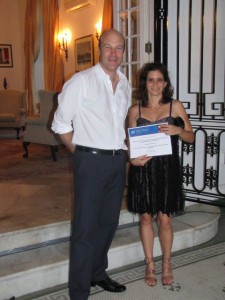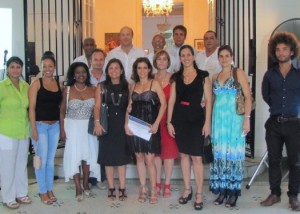10th September 2013 Havana, Cuba
Chevening Cubans

This month Aimée Gonzalez, a Cuban development worker, will travel to London to start her studies in local development. Aimée is a Chevening scholar and I’m really pleased that the British government will be paying for her to study a Masters degree at the London School of Economics (LSE). Every year all over the world British Embassy staff interview and select people to receive a Chevening scholarship to study in the UK. In the Chevening programme we are looking for future leaders, people who will benefit from a British education and have a positive impact on the development of their country.
Past Chevening scholars from Cuba work in a range of sectors here – academia, research, communications, marketing, development – and for a range of employers – the state of course but also academic institutions and the Catholic Church. We’re also very lucky to have one ex-scholar working here in the British Embassy. Other ex-scholars have, like many Cubans, found jobs overseas. For example, a good friend of mine, Manuel Barcia Paz is an academic at Leeds University where he teaches and writes about Cuban history (his book ‘The Great African Slave Revolt of 1825: Cuba and the Fight for Freedom in Matanzas’ came out last year).

Why do Cubans want to study in the UK? For lots of different reasons of course. British universities provide an excellent education – many feature high up on the lists of the best universities in the world, with six in the world’s top twenty according to recent research. They are also great places to improve your English, increasingly the language of international business, academia and exchange. And you get to mix with people from all over the world – at the LSE for example, where Aimee will study, around two-thirds of the 9,300 students come from countries other than the UK.
What does the British government want in exchange? Not as much as you might think; there are no contractual obligations at all. We want Chevening scholars to stay in touch with us and tell us what they are doing. We often find they are good people to turn to for advice about British policy (largely because they understand the UK quite well) or to act as a sounding board. We hope their experience in the United Kingdom will be exciting and memorable, that the experience helps them succeed in their own line of work and that as they succeed they recall the United Kingdom favourably. However, I am going to ask Aimée for one specific thing whilst she is in London – to write a guest blog for me during her year about her experiences. Meanwhile, if you are interested in applying for a Chevening scholarship, applications for Cubans are now open and will close on 8 November. You can also follow Chevening on Twitter and read more from Chevening scholars from all around the world here. Finally, if you’re a Chevening scholar from Cuba and want to get in touch, please comment below. Thanks!
Well done for those who applied for a Chevening Scholarship and succeeded!! Wholeheartedly, congratulations!! Take adventage of the chance to the full not just for yourself but to use the chance to help make a good Change Management in our beloved Cuban island. I am confident that in a future Cuba it will prevail our preserving all that may prove preservable from Socialism and all that may prove preservable of Consumption Society, where all the Human Rights for Everyone will have to be respected, in just one word: Social Democracy. Perhaps in a long term, Cuban Chevening alumnis will make a great contribution to attain this.
As an ex-British Council Cuba staff and Chevening Manager, I can say that there was never a better programme to showcase British and Cuban academic and cultural expertise and relationship. For 10 years I had the opportunity to work and share with a number of high level Cuban professionals like Manuel Barcia, Davide Casagrandi, Neysi Ibarra, Arnaldo Hernandez, Yanet Toiraq, Ivan Darias, who are today reinvesting in their knowledge and expertise both in Cuba or the UK the list is a never ending one….The British Embassy and the British Council in Havana can be proud of this programme which has made possible a succesful combination of Cuban academic quality and British excellence in Education.
I am a past Chevening scholar myself and the experience hugely changed my life both professionally and personally. After my MSc at University College London, went back to my hospital in Havana, where I worked during more than 5 years in several projects related with stuff I learnt during my MSc. I am now back in London, and my work is still related with my MSc course!
This is a great idea and opportunity for cuban students. If I were just younger…
It would be good if this information could reach more people beyond the web site since not everybody is able to have access to internet or any web site.
Saludos
Martha